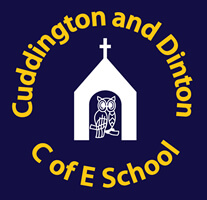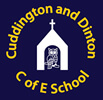Intent
At Cuddington and Dinton C of E Primary School, we foster a love of reading and aim for children to read easily, fluently and with good understanding. Children develop the habit of reading widely and often, for both pleasure and information. Reading expands and enhances their imagination, knowledge and understanding. Children are immersed in a reading curriculum that is rich and varied, with quality texts to develop inquisitive and thoughtful readers.
Implementation
Early Reading
We prioritise the development of early reading by putting it at the heart of our curriculum. Using robust and systematic synthetic phonics teaching, we provide an effective transition into independent reading. Phonics is an essential tool, but we are aware that, whilst phonic knowledge enables pupils to decode words, it does not teach them to understand meaning. We achieve this by providing opportunities for our pupils to sing, hear and engage with stories and rhymes, to gain an understanding of what words mean through early, verbal comprehension. These solid and secure foundations are then built upon to enable the children to be fluent, confident readers.
Phonics
Phonics is an essential ingredient in learning to read. Children begin phonics lessons on entry to the Early Years Foundation Stage. We use the Bug Club Phonics teaching programme to support the daily teaching of synthetic phonics. This scheme also provides interactive teaching tools that can be utilised in phonics sessions.
Reading Books
Phonically decodable books are introduced in EYFS in order to support every child on their reading journey towards developing a strong phonic knowledge and a love of reading. As they progress through each phonic phase, we aim for children to become proficient readers of the phonically decodable books which cover both fiction and non-fiction texts. Each fully decodable book is aligned to each child’s Bug Club Phonics sound journey to ensure all pupils in EYFS and KS1 move from decoding words to reading fluently and for pleasure. Each
pupil’s reading journey is tracked by their class teacher to ensure systematic progression. When children complete the phonics scheme, they move from the phonically decodable books onto the Key Stage 1 banded reading scheme.
Class Reading
EYFS to Year One
Reading at Cuddington and Dinton C of E School encompasses both guided group reading and whole class teaching. All children in EYFS and Year 1 demonstrate their participation through verbal contributions, drama activities and, where appropriate, written responses. Reading sessions include: sharing stories together, retrieving key information, acquiring new vocabulary, building cultural capital and developing oracy skills.
Whole Class Reading
Years Two to Six
Good comprehension draws from linguistic knowledge (in particular vocabulary and grammar) and on knowledge of the world. Children explore quality texts and extracts from a range of genres. Comprehension skills develop through pupils’ experiences of high-quality discussion with the teacher and their peers.
We have daily reading comprehension sessions from Year 2 onwards to ensure that children read age-related texts and answer V.I.P.E.R.S (Vocabulary, Inference, Predict, Explain, Retrieve and Summarise / Sequence) as our method to explicitly teach each skill. These whole class reading comprehension sessions are used as a powerful tool to allow all children to make progress in reading and provide regular and supportive opportunities for children to encounter engaging texts that will resonate with their interests and capture their imagination. Carefully graded questions allow for children to develop their comprehension skills at an appropriate level.
Responses to reading and learning are regularly recorded in Reading Journals. Reading skills are transferred across the wider curriculum where children read in other subjects to gain knowledge and understanding. In addition to this, fluency and prosody are practised through reading activities such as choral,
echo and individual reading. Decoding continues to be supported through spelling lessons, incorporating phonics, syllabic and etymological understanding of words, using the Spelling Shed (EdShed) platform.
Impact
The impact of our reading curriculum is clear: progress, sustained learning and transferrable skills. Pupils will make at least good progress from their individual starting points. Through the teaching of systematic phonics, our aim is for children to become fluent readers by the end of Key Stage 1. This way, children can focus on developing their fluency and comprehension as they move through the school. By the time that pupils leave Cuddington and Dinton C of E Primary School at the end of Key Stage 2, they will be able to apply their reading skills across the Key Stage 3 curriculum and will transition to Secondary School appreciating the craft of the author and having a love for reading. At Cuddington and Dinton C of E School, progress is tracked using a range of evidence.
• Phonic Assessments
· Year One Phonics Screening Check
• Statutory Tests (SATs) in Year 6
• Termly Reading Assessments
• Work in Reading Journals
• Reading Book Looks and Pupil Voice surveys
• Guided reading learning walk

